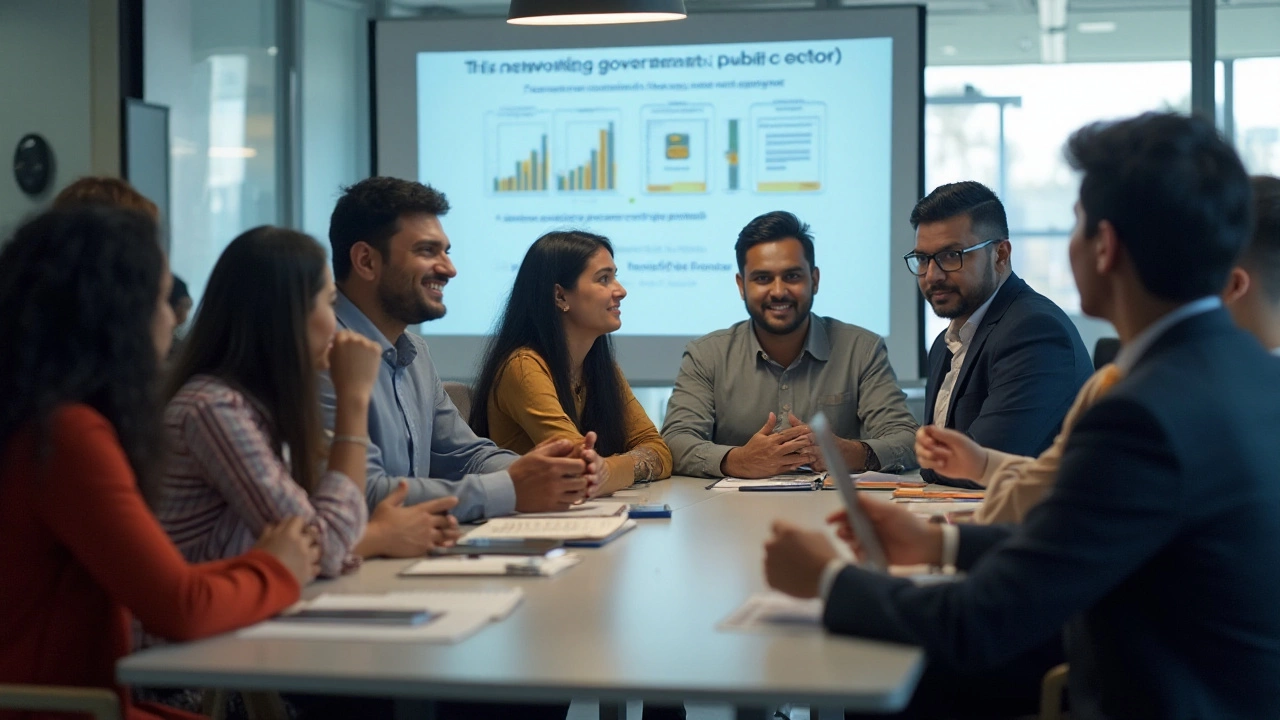
Considering a career in government isn’t just about landing a stable job; it’s about stepping into a role where you can contribute meaningfully to society. The allure of such a path is undeniable, with its promise of stability, varied opportunities, and meaningful work.
Embarking on this journey requires a well-planned approach. From grasping the array of job types available to understanding the qualifications and exams you need to prepare for, there are several steps to consider. Networking plays a crucial role too, as connections within the public sector can open doors you never knew existed.
Preparation is key, whether it involves studying for civil service exams or honing skills specific to the role you aspire to. With the right guidance and dedication, a fulfilling government career is well within reach.
- Understanding Government Job Types
- Acquiring Necessary Qualifications
- Networking within the Public Sector
- Effective Preparation Strategies
Understanding Government Job Types
The government sector is a vast landscape filled with diverse opportunities that cater to a variety of skills and interests. At its core, it's about serving the public, but there are numerous paths that one can follow to achieve this. Each path offers a unique way to contribute to society, whether it’s through policy creation, data analysis, public health, or maintaining international relations. Understanding the layout of government job types helps in aligning your career dreams with an appropriate sector.
One can typically segregate government jobs into two main categories: civil service roles and public sector positions. The civil service jobs often involve working directly within government departments, dealing with administrative tasks, policy work, and various managerial roles. On the other hand, public sector jobs can include a broader category such as education, healthcare, policing, and more, where the interaction with the public is more direct.
Diving deeper, we can see specific job families within these broad categories. Law enforcement, for example, is an integral part of government jobs ensuring community safety and enforcement of the law. Positions here include police officers, intelligence analysts, or forensic experts. Similarly, the healthcare sector in government is vast, covering roles for doctors, nurses, public health advisors, and medical researchers. In fact, during recent years, with the global emphasis on health, this sector has seen increased funding and focus, making it an attractive option for many aspirants.
“
Working in the government allows individuals to be instrumental in enacting change and improving lives on a macro level,” says John Doe, a veteran civil servant with over three decades of experience.
For those inclined towards analytical careers, government offers roles in data analysis, financial auditing, economic planning, and more. These jobs are crucial for shaping policies based on data-driven decisions. The knack for numbers and a keen eye for detail can lead you to careers like budget analysts or statisticians, often found diligently working behind the scenes to guide major governmental decisions.
Moreover, the rise of technology has opened up new vistas in the governmental landscape. IT specialists, cyber-security experts, and technology innovators are increasingly in demand to protect sensitive government data and innovate processes through digital transformation. With the growing need for sustainable practices, environmental scientists and renewable energy experts also find rewarding careers in the governmental sector.
A 2022 survey indicated that nearly 45% of the workforce in government positions were involved in administrative and clerical roles, while a substantial percentage was engaged directly in public service delivery. Here’s a simplified representation of these statistics:
| Job Category | Percentage |
|---|---|
| Administrative and Clerical Roles | 45% |
| Public Service Delivery | 35% |
| Technical and Specialist Roles | 20% |
Being aware of the myriad types of government jobs helps you pinpoint areas that match your skills and ambitions. This foundational knowledge not only assists in making informed decisions but also prepares you for the specific qualifications you need to pursue these roles, setting you on the path to a promising career within the government.

Acquiring Necessary Qualifications
Diving into a government career starts with understanding the specific qualifications required, which often depend on both the role you're eyeing and the country’s regulations. Typically, government positions call for a minimum educational criterion. For entry-level administrative roles, a bachelor’s degree might suffice, while more technical or specialized positions could demand degrees in fields like law, engineering, or public administration. It’s crucial to research the exact requirements for the job you seek, ensuring your educational pathway aligns with job expectations.
Beyond degrees, many government jobs require specific certifications or licenses. For instance, a public school teacher will need teaching credentials, while a health inspector might need certification in environmental sciences. Obtaining these credentials often involves passing relevant exams that test both theoretical knowledge and practical skills. Future applicants should proactively prepare for these by varying their study materials and, if possible, attending prep courses tailored to the exams.
Assessing one's skills and identifying gaps is vital. Courses offered by universities or online platforms can help in brushing up on necessary skills. Engaging with these resources refreshes existing knowledge while covering areas that might be lacking. It's always beneficial to bring real-world skills to the table. Communication prowess, analytical thinking, and leadership capabilities are valued across various public sector jobs. Aspiring government employees should enhance these skills through workshops, volunteer opportunities, or relevant job roles.
Understanding Examination Components
In numerous countries, civil service examinations are a pivotal part of the recruitment process. These exams often evaluate a mix of general aptitude, domain-specific knowledge, and sometimes assess candidates' personalities and ethical viewpoints. Preparing comprehensively for these exams can dramatically boost one’s chances of qualification. Building a study schedule that covers all necessary components and includes periodic mock tests can be critically valuable."Government work isn’t just about regulations; it’s about understanding and interpreting those regulations to serve the public good," remarked Dr. Susan Thompson, a notable figure in public administration.
With time and diligence, fulfilling qualifications for a public sector job becomes achievable. Before making career decisions, aspiring professionals should understand the demands of the field, both day-to-day and long-term. Equipping oneself with the right academic background, certifications, and skills sets the foundation for a successful career in government.

Networking within the Public Sector
Stepping into the world of government jobs can often feel like navigating a labyrinth, especially if you’re new to the scene. Networking is crucial in this context. Not only does it open doors to opportunities that might otherwise remain hidden, but it also provides invaluable insights into the inner workings of the public sector. Unlike many professions, where merit alone might suffice, the government realm often thrives on knowing the right people. Establishing these connections can be your passport to a successful government career.
The Importance of Professional Networks
Building a network doesn’t mean collecting contacts like trading cards. Instead, it’s about fostering genuine relationships with professionals who share your passion for public service. According to a survey by LinkedIn, 85% of all jobs are filled via networking. For government jobs, this statistic holds particular significance. Through networking, you can gain access to mentorship, advice, and potentially unadvertised job openings within the public sector.
Attending workshops, seminars, and government-related conferences can be an excellent way to meet influential figures in the field. These events are gold mines for insights. Online platforms like LinkedIn and industry-specific forums also offer a digital venue to create lasting connections. Engage with content, participate in discussions, and don't shy away from reaching out for informational interviews. These interactions not only help you to broaden your knowledge but also enhance your visibility in the field.
"Networking is not about just connecting people. It’s about connecting people with people, people with ideas, and people with opportunities." - Michele Jennae
Mastering the Art of Communication
Effective communication is at the heart of successful networking. Whether communicating online or in person, clarity and professionalism cannot be overstated. When attending physical events, always bring along business cards you can hand out as a memory aid for those you meet. Follow up promptly and respectfully with people you’ve connected with, referencing a part of your initial conversation to reinforce familiarity. Online, professionally tailored profiles are essential. They should be an accurate representation of your civil service ambitions and capabilities, showcasing your journey so far.
Be sure to reciprocate where possible. Offer your own insights or assistance when you’re able, as this creates a network that's mutually beneficial. Understanding current policies and government changes can serve as excellent conversational points, often stimulating interest from the other party. By demonstrating that you're well informed and proactive, you become memorable, setting yourself apart from the competition.
Supporting Communities
Active involvement in governmental communities and forums can also significantly benefit your networking efforts. These two-way communication platforms encourage the sharing of knowledge and experiences, offering support to those facing similar challenges. Not only does this hone your skills, but actively participating can introduce you to individuals who hold influence over hiring or progression decisions in the public sector. Leadership roles in community projects or government focus groups further enhance your profile, displaying commitment and leadership—qualities highly valued in government positions.

Effective Preparation Strategies
Diving into a government career certainly requires meticulous planning and dedicated preparation. The competition is often stiff, given the security and benefits associated with public sector jobs. Therefore, adopting strategic methodologies can equip you with the edge needed to excel. It's not just about the right qualifications or experience but knowing how to present them at the right time.
To start, familiarity with the specific requirements of the job you're eyeing is vital. Each position, whether in civil services or specific public sector roles, demands its unique set of skills, educational qualifications, and sometimes, even a particular mindset. For instance, roles in policy-making might require an in-depth understanding of current affairs and political theories, whereas administrative positions need organizational skills. You can often find these details in job notifications or official government portals. Preparing accordingly helps you align your background to the demands of the role, making you a visible fit for the position.
Studying for civil service jobs or any government examination means immersing oneself in a variety of subjects. It's advisable to create a structured timetable that covers all areas of the exam syllabus, making sure to allocate extra time for topics that might be your weak spots. Regular revision and practicing old question papers can provide a clear advantage, as they acclimate you to the pattern and style of questions. Online platforms today offer a plethora of mock tests and study materials, enhancing your preparation manifold.
Networking is another underestimated yet powerful strategy. Building connections with current and former government employees can provide insider insights into the hiring process and the daily challenges and expectations of such roles. Attending seminars, webinars, or even engaging in online forums focused on public sector careers can help you stay informed about industry trends and changes.
According to a report by the National Association of Government Employees, "Networking not only facilitates greater career opportunities but also helps in personal development through shared experiences."
The resources available today, both online and offline, are tremendous. With digital libraries, e-learning platforms, and prep books, one might feel overwhelmed, so prioritizing content that aligns with your exam's syllabus is key. Subscribing to journals and reading government-published reports can also be beneficial; they aid in developing an understanding of the functioning and priorities of government bodies. Public sector jobs often test not just your factual knowledge but your ability to apply that information practically.
Finally, maintaining a disciplined routine is essential for success. Regular study, along with breaks to relax and recharge, keeps the mind fresh. Joining study groups can also be motivating, allowing for sharing and testing ideas in a collaborative environment. By integrating these strategies, one can not only increase the chances of securing a role but also excel within it, paving a path toward a rewarding career in the public sector jobs.
More Articles

Which Degree Is the Easiest? A Practical Guide to Low‑Effort Online Degrees
Discover which online bachelor's degrees are the least demanding, their pros and cons, and a step‑by‑step guide to pick the right easy degree for your career.

Which Is the Toughest MBA?
If you're eyeing an MBA, you've probably wondered which program would push your limits the most. Different MBAs provide varied challenges, from grueling finance courses to leadership hurdles. Understanding these intricacies can help you decide which program aligns with your career goals and personal resilience. Let's uncover the paths that demand the most grit.

Mastering Confident and Fluent English Speaking Skills
Speaking English fluently and confidently is a goal for many language learners. It's more than just knowing words and grammar; it involves active practice, a supportive environment, and proven strategies. Embark on a journey to unlock your potential with handy tips and techniques aimed at enhancing your speaking skills. Dive into a world where communication barriers dissolve, and watch your confidence soar.
